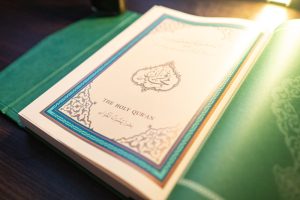
The Review of Religions is delighted to present the complete English translation of the commentary of Sūrah al-Ikhlāṣ – Chapter 112 of the Holy Qur’an – by Hazrat Mirza Bashiruddin Mahmud Ahmad (ra) translated into English for the first time.
Sūrah al-Ikhlāṣ, one of the shortest chapters in the Qur’an, discusses the unity of God, and so contains the essence of the entire Islamic teaching. Just as Sūrah al-Fātiḥah is considered to be an outline of the entire Qur’an, Sūrah al-Ikhlāṣ, together with the two succceeding chapters, Sūrah al-Falaq and Sūrah al-Nāṣ, also contains the themes mentioned in Sūrah al-Fātiḥah. Indeed, in one tradition, the Holy Prophet (sa) stated that Sūrah al-Ikhlāṣ, is equal to one-third of the Holy Qur’an.
This is one of the most insightful and in-depth commentaries of the Holy Qur’an ever written, and The Review of Religions has the honour to publish it for our English readers for the first time.
By Hazrat Mirza Bashirrudin Mahmud Ahmad (ra)
Second Worldwide Head of the Ahmadiyya Muslim Community
Translated by Murtaza Ahmad
Edited by The Review of Religions Translation Team
The Virtues of Sūrah al-Ikhlāṣ
The Holy Prophet (sa) has declared this chapter to be one-third of the Qur’an. Thus, he has stated:
” ِمَنْ قرَأَ قُلْ هُوَ اللهُ أَحَدٌ فَكَأَنَّمَا قَرَأَ ثُلُثَ الْقُرآن”
That is, ‘for he who recites Sūrah al-Ikhlāṣ, it is as if he has recited one-third of the Holy Qur’an.’ [1]
Furthermore, Abu Sa‘id Khudri (ra) states that the Holy Prophet (sa) said:
“ِوَالَّذِيْ نَفْسِيْ بِيَدِهِ إِنَّهَا لَتَعْدِلُ ثُلُثَ الْقُرْآن”
That is, ‘I swear by the One in Whose hands my life lies that Sūrah al-Ikhlāṣ is equivalent to one-third of the Holy Qur’an.’ [2]
This chapter being equivalent to a third of the Holy Qur’an does not imply that it is [actually] one-third of the text of the Qur’an. Rather, it only implies that its subject matter possesses particular significance. From reading the Holy Qur’an and the ahadith, it appears that two major trials would emerge in the latter days; the first would be the trial of the Antichrist and the second that of Gog and Magog. Both of these were to clash with Islam, one after another.
The first trial was in the form of the Trinity (God the father, God the son and God the holy spirit) instead of adopting the One God. And the second trial was that of atheism, or one who rejects the existence of God outright. The Holy Qur’an has refuted the creeds of both these trials and has elucidated the correct doctrines. The Holy Qur’an is replete with the praise of God the Father, and in this way, it supports the notion that God the Father is One and the Provider. Moreover, it very strongly negates the idea of God the son and God the holy spirit. In other words, the Holy Qur’an has established the divinity of God the father and has rejected God the son and God the holy spirit. Thus, it is clear that since one-third of the Holy Qur’an supports the notion of God the father, therefore, Sūrah al-Ikhlāṣ is equivalent to a third of the Holy Qur’an.
In fact, the aim of the Holy Qur’an is to establish the unity of Allah and to eliminate false doctrines. So when this chapter so completely yet so succinctly addresses this subject – which refutes false doctrines and explains the true reality of God’s unity – then it is equal to not just one-third of the Qur’an, but rather all of it. Therefore, there is no exaggeration in the Holy Prophet (sa) declaring this chapter to be equivalent to a third of the Holy Qur’an; rather, it is in view of the importance of its subject matter. Thus, because of this importance, the Holy Prophet (sa) has also called it the Greatest Chapter.[3]
It is narrated that when this chapter was revealed, 70,000 angels descended with it. [4] This narration also confirms the significance of this chapter. It should be remembered that these types of narrations – which mention certain chapters being accompanied by angels – do not mean that the angels are protecting the chapters as they are being revealed but rather that they are protecting them after they have been revealed. This is because each chapter relates to a particular subject matter and, at times, contains prophecies. The truthfulness of the chapter depends on the fulfilment of these prophecies. Sometimes these prophecies pertain to physical events and sometimes to the deeds of man. Those prophecies having to do with people’s actions are particularly significant in that those who are forewarned about a divine punishment try their very best to prevent its fulfilment. Generally, because these prophecies are made in extraordinarily hostile circumstances, their fulfilment seems impossible or improbable through any worldly means. However, they can only be fulfilled when Almighty God provides His hidden support. Thus, for the chapters that contain these sorts of prophecies, which even mighty nations try to falsify, God Almighty commands those angels to whom various duties of this world have been assigned, to provide hidden means so that those prophecies may be fulfilled without any obstacles.
Although Sūrah al-Ikhlāṣ contains no prophecy, it does discuss the subject of the unity of God, and as we mentioned above, in the latter days, two grave trials were to arise opposing the unity of God, such that if God Almighty had not arranged for heavenly angels to eliminate them, Muslims would not have been able to contend with them and it would have been difficult to challenge them. In order to safeguard the unity of God, God Almighty appointed 70,000 angels so that when the trials of the Antichrist and Gog and Magog attacked the unity of God with their full force and resources, angels descended from the heavens to eliminate them and despite hostile conditions, established this unity in the world. Idolatry and atheism would be destroyed and just as the kingdom of God Almighty is found in the heavens, it would also be established on the earth.
One of the narrations concerning the excellences of this chapter is by Hazrat Anas (ra), in which he mentions that a companion from the Ansar [those from the city of Madinah] led the prayers in the Quba Mosque. Before reciting any chapter during the salah [obligatory prayers in Islam], he would first recite Sūrah al-Ikhlāṣ and then recite another chapter. The congregation asked him that if it was enough to recite one chapter in each rak‘ah [unit of prayer], then why did he need to recite another chapter? At this, the companion replied that he would not stop reciting Sūrah al-Ikhlāṣ even if it meant that he would be dismissed from the duty of leading prayers. Because he was the best-suited person to lead prayers in that neighbourhood, he was not removed from this duty. When the Holy Prophet (sa) visited the neighbourhood, this issue was presented to him. Then the Holy Prophet (sa) asked this companion why he recited this chapter in every rak‘ah. The companion replied: ” .إِنّيْ أُحِبُّهَا “
That is to say, he loved the chapter’s meaning because it contained God Almighty’s unity. Upon this, the Holy Prophet (sa) replied,
َحُبَُكَ إِيَّاهَا أَدْخَلَكَ الْجَنَّة
That is, ‘your love for this Chapter has caused you to enter paradise’. These words of the Holy Prophet (sa) show that if a person firmly establishes themselves on the unity of God, and relies completely on Allah Almighty, then they will enter paradise.
Similarly, in the narrations it states:
أَنَّ رَجُلاً جَاءَ إِلَى النَّبِيِّ وَشَكَا إِلَيْهِ الْفَقْرَ فَقَالَ: إِذَا دَخَلْتَ بَيْتَكَ فَسَلِّمْ إِنْ كَانَ فِيْهِ أَحَدلٌ، وَإِنْ لَمْ يَكُنْ فِيْهِ أَحَدٌ فَسَلِّمْ عَلَى نَفْسِكَ وَاقْرَأْ [قُلْ هُوَ اللهُ أَحَدٌ
That is, a person came before the Holy Prophet (sa) and complained about his poverty. The Holy Prophet (sa) stated that when he entered his house and somebody was there, he should say ‘peace be upon you’ [Assalamu Alaikum] to them. And if nobody was home then he should send the greetings of peace to himself, and then recite once قُلْ هُوَ اللَّهُ أَحَدٌ [Say, ‘He is Allah, the One’].[5]
The narration mentions that this companion acted according to this instruction of the Holy Prophet (sa), and as a result, not only was his poverty eliminated, he ended up with so much money and wealth that he was even able to help his neighbours
The reality is that when a person realises that there is a God Who possesses all powers and Who can bless their work, they will have absolute trust in Him and submit to Him alone. And when a person combines effort and prayer, then their problems are overcome. This narration teaches us the importance of hard work, absolute trust in God and prayer.
ENDNOTES
[1] Fath-al-Qadir, Imam al-Shawkani.
[2] Al- Durr al-Manthur, Kanz al-‘Ummal, Fath al- Qadir and Tafsir al Razi.
[3] Ruh al-Ma‘ani. This is a well-known 19th-century work of Qur’anic commentary authored by Iraqi scholar Mahmud al-Alusi. [Reference cited by author. Explanatory note: The Review of Religions.]
[4] Ruhul Bayan. This is also a Qur’anic commentary authored by Turkish scholar Ismail Haqqi, who lived in the 17th century. [Reference cited by author. Explanatory note: The Review of Religions.]
[5] Ruhul Bayan




Add Comment